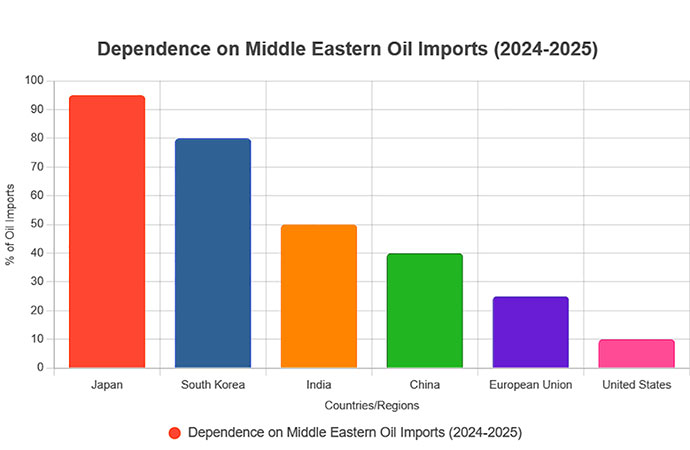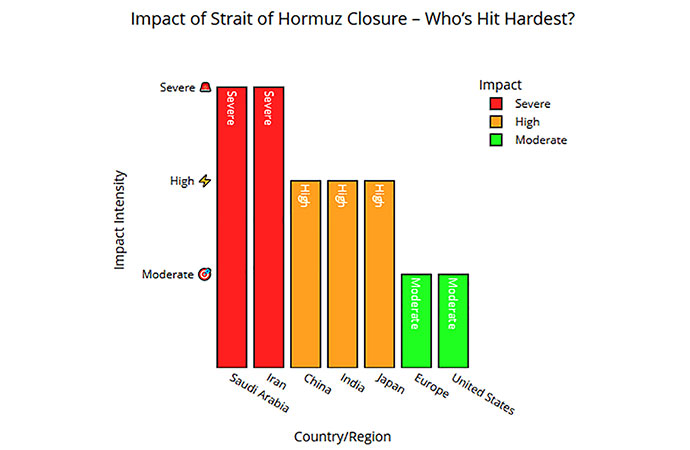Global


Imagine filling up your car, dreading the price, or skipping a meal to afford basics. The Strait of Hormuz, a slim waterway carrying a fifth of the world's oil, is intertwined with everyone's livelihood. But with Israel and Iran trading blows, there's fear: could this conflict block this vital artery carrying the lifeblood of our global trade?
This isn't just news you can scroll past, it hits you directly, every day through the food on your table and the lights that illuminate them. Energy is what makes our modern world possible.
Al Jazeera's June 16, 2025, reports say Iran might not fully close the strait, but even a partial blockade could spike oil to $150 a barrel. That's pricier gas, food, and heat, like 2022's pain but worse. For poorer nations, it's hunger; for those a little better off, maybe a tighter budget.
Iran risks its own economy, oil exports flowing through the strait, and U.S. retaliation. But if Israel pushes too hard, Iran might disrupt shipping with mines or boats, like in 2019's tanker attacks.
Inflation could surge, hiking bills and threatening jobs. In developing countries, riots could flare. The Israel-Iran fight might drag on, fueled by oil money. China and India could get antsy, and prolonged U.S. intervention might spark a bigger clash. In Iran, desperate citizens might cheer defiance-or turn on their leaders if it fails.
The Strait of Hormuz is one of those aspects of humanity that we only notice when it isn't functioning. And when it stops working, the results can be catastrophic.
Strategic Importance of the Strait of Hormuz
The Strait of Hormuz is the sole sea route for oil and gas exports from key Persian Gulf countries, such as Saudi Arabia, Iraq, the United Arab Emirates, Kuwait, and Iran, to reach global markets. In 2022, it carried 21 million barrels of oil each day, making up about one-fifth of the world's oil use. It also transports around 20% of the world's liquefied natural gas (LNG), which is vital for nations like Bangladesh, India, and China that rely heavily on LNG imports from Qatar. If the strait were to close, it would disrupt these essential energy supplies, causing immediate worldwide impacts.
Immediate Impacts on Energy Supplies
The Strait of Hormuz, a narrow waterway carrying a fifth of the world's oil and vital liquefied natural gas (LNG), is now blocked as of June 22, 2025. This isn't just a supply issue it's a crisis hitting your daily life. Experts warn oil prices could soar past $100 per barrel, with some, like Bjarne Schieldrop from SEB, predicting a terrifying $300 per barrel if the closure lasts a month, before possibly easing below $200. LNG shortages, especially from Qatar, hit India hard, relying on Qatar for 45% of its LNG, and China, with 25%, face blackouts and skyrocketing costs. Other routes, like Saudi Arabia's Petroline or the UAE's Fujairah pipeline, can't keep up, leaving families and businesses worldwide grappling with pricier fuel, food, and power.
Countries Most Affected
The closure disproportionately affects countries reliant on Gulf oil and gas imports, as well as the Gulf exporters themselves. Below is a detailed breakdown:
Oil-Importing Countries
• Japan: Relies on the Middle East for 95% of its crude (Saudi Arabia: 1.14 million b/d; UAE: 1.12 million b/d in 2023). Families face higher fuel and heating costs, and factories may cut production.
• South Korea: Gets 80% of its oil from the Gulf, including Qatar and Saudi Arabia. Refineries face costlier inputs, raising prices for goods.
• India: Sources 50% of its oil from the Middle East (OPEC's share: 51.5% in 2024). Rising transport and food costs strain households.
• China: Imports 40% of its oil from the Gulf, with Saudi Arabia supplying 1.6 million b/d in 2024. Manufacturing slowdowns threaten workers' livelihoods.
• European Union: Gets 25% of its oil from Iraq and Saudi Arabia. Despite U.S. and Guyana imports, price hikes hit consumers.
• United States: Imports only 10% from the Middle East, with Canada (55.67%) and Mexico (12.09%) as main suppliers. Global price rises still affect budgets.
Oil-Exporting Countries
• Saudi Arabia, Iraq, UAE, Kuwait: These nations rely on the strait for nearly all their oil exports. A closure could lead to significant revenue losses, constraining budgets for social services, infrastructure, and public sector employment.
• Iran: Ironically, Iran's own oil exports, which constitute 65% of its government revenue, are also disrupted, potentially leading to a 5-10% GDP drop and increased domestic unrest.
• Qatar: As a major LNG exporter, Qatar's economy faces severe impacts, with 70% of its LNG exports to Asia disrupted.
Global Impact
The United States, though largely energy-independent, still relies on some Gulf oil imports and would face rising global oil prices due to the Strait of Hormuz closure. Developing nations, with fewer resources to handle these price spikes, could experience severe energy shortages, disrupting agriculture and manufacturing.
Economic Ramifications
If ships are forced to detour around the Arabian Peninsula, shipping costs will shoot. Oil and gas prices soaring will make everything pricier: your groceries, your commute, your heating. A 2019 scare spiked Brent crude prices 20%; a month-long closure could be far worse, fueling inflation. Factories slow, farmers struggle, and shops raise prices. You might cut back on spending, and global growth could stall. Central banks may hike rates, squeezing your budget further. On social media, people lament a "paralyzed" economy, some say it would be "suffocated".
Potential Mitigation Efforts
Countries scramble for solutions, but they're limited. Pipelines like Saudi Arabia's Petroline or the UAE's Fujairah can't match the Strait's volume. Buying more oil from the U.S. or Russia takes time and costs more. Diplomacy or military action to reopen the strait is crucial but risky, with no easy fix. Replacing pipelines with tanker ships is no easy task.
The Strait of Hormuz closure threatens our world, disrupting energy for China, Japan, India, and Gulf exporters like Saudi Arabia and Iran. Inflation looms, tensions rise, and the poorest suffer most. Diplomacy or military action is needed to restore stability, but the path is fraught.
Md Arman Hossen is the Product Analyst of United News of Bangladesh.

























Leave a Comment
Recent Posts
Pedaling Through the Mangroves ...
The journey from the bustling streets of Barishal to the serene, emera ...
Why the Interim Government mus ...
Two weeks out from what is expected to be a red letter day in the figh ...
Doesn’t matter who thinks what about Bangladesh deci ..
The Other Lenin
US President Donald Trump said his administration
Govt moves to merge BIDA, BEZA, BEPZA, MIDA